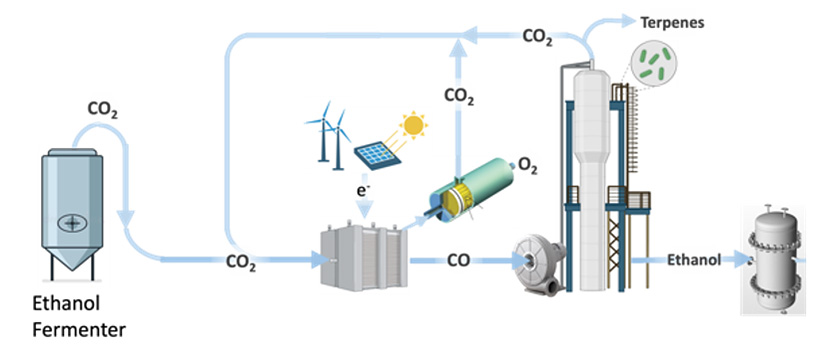
Michael Resch holds a Ph.D. in biochemistry and molecular biology from Colorado State University. His dissertation work focused on the biophysical and structural properties of nucleosomes and chromatin arrays in vitro in the laboratories of Karolin Luger and Jeffery Hansen at Colorado State University, in Fort Collins, Colorado.
Michael's career at NREL began in 2008 as a postdoctoral researcher working on cellulase and hemicellulase enzyme characterization, funded by the U.S. Department of Energy (DOE) through the Bioenergy Science Center and the Bioenergy Technologies Office (BETO). The goal of these studies was to improve the hydrolysis efficiency of cellulase and hemicellulase enzyme digestion of biomass. This work helped NREL lower the industrial cost of lignocellulosic enzyme conversion of biomass to sugars for biofuel production.
During this time, Michael was also involved in investigating biological lignin depolymerization
with the ultimate goal of converting lignin into value-added fuels or chemicals. Lignin
is an underutilized biomass component that has historically been used for heat and
power in industrial settings. To enable this technology,
Michael worked on biophysically characterizing metabolic enzymes involved with the
upgrading of lignin and sugar-derived intermediates into fuels and chemicals.
From 2014–2016, Michael was the manager of the Bioprocess Research Group in NREL's National Bioenergy Center. The researchers in this diverse group were involved with microbial development of photobiological and fermentation applications along with analytical chemistry expertise.
From October 2016 to September 2017, Michael was on assignment on a Materials & Operations Detail at BETO in Washington, D.C., supporting the Advanced Algal Systems and Conversion Platforms. Michael provided technical expertise to ensure the integration of strong research, technology, and industrial perspectives in the planning and oversight of BETO's research and development efforts. Michael assisted in the planning and implementation of technical priorities as well as analysis to support the BETO formulation of program goals and metrics.
In 2017, Michael helped start the BETO-funded Feedstock-Conversion Interface Consortium (FCIC). He led the Industry Engagement and Project Management and outreach activities, where he served as a liaison between the FCIC national labs, industry, and BETO. The FCIC is an integrated and collaborative network of eight national laboratories (NREL, Idaho National Laboratory, Oak Ridge National Laboratory [ORNL], Pacific Northwest National Laboratory, Lawrence Berkeley National Laboratory [LBNL], Los Alamos National Laboratory, Sandia National Laboratories, and Argonne National Laboratory [ANL]) dedicated to understanding and addressing technical risks in developing and scaling up biomass collection, storage, handling, preprocessing, and conversion technologies with the goal of enabling the overall operational reliability improvement of integrated pioneer biorefineries.
In addition, Michael currently leads a BETO-funded CO2 Reduction and Upgrading for e-Fuels (CO2RUe) Consortium. In Fiscal Year 2021, BETO funded ~$10 million/year for national labs to explore innovative approaches for using carbon dioxide (CO2) in the production of biofuels and bioproducts. Ten projects were awarded funding and, along with three established projects, were organized in a multinational lab, CO2RUe Consortium. To supply domestic fuel demand, traditionally sourced from petroleum, the CO2RUe Consortium is investigating how CO2 emitted from biorefineries can be converted to fuels and chemicals of extremely low carbon intensity. The mission of CO2RUe is to develop technologies to upgrade CO2 to fuels and chemicals to reduce greenhouse gas emissions as well as land and water use and incentivize decarbonization.
The CO2RUe Consortium technology areas include electricity and CO2 feedstock supply and logistics; techno-economic analysis and life cycle assessment modeling; CO2 electrochemical reduction; and intermediate biological upgrading into sustainable aviation fuels and high-value co-products. The 13 individual projects are performed at ANL, LBNL, Lawrence Livermore National Laboratory, NREL, and ORNL, and many of the projects are multilab performers having joint milestones in FY 2023. For technical and strategic assistance, CO2RUe has formed an external advisory board with members from academic and industrial experience, along with an internal advisory board consisting of national lab leadership. The consortium technical scope is working toward supporting BETO’s goals of achieving cost parity of $3 per gallon gasoline equivalent of advanced renewable fuel from CO2.
Affiliated Research Programs
CO2 Reduction and Upgrading for e-Fuels (CO2RUe) Consortium
Feedstock-Conversion Interface Consortium (FCIC)
Enzyme and Microbial Development
Biomass Deconstruction and Pretreatment
Biological and Catalytic Conversion of Sugars and Lignin

Featured Publications
Electrifying the Production of Sustainable Aviation Fuel: The Risks, Economics, and
Environmental Benefits of Emerging Pathways Including CO2, Energy & Environmental Science (2022)
Engineered Yeast Tolerance Enables Efficient Production From Toxified Lignocellulosic Feedstocks, Science Advances (2021)
Analysis, Impacts, and Solutions to Biomass Variability for Production of Fuels and Value-Added Products, ACS Sustainable Chemistry & Engineering (2020)
Throughput, Reliability, and Yields of a Pilot-Scale Conversion Process for Production of Fermentable Sugars from Lignocellulosic Biomass: A Study on Feedstock Ash and Moisture, ACS Sustainable Chemistry & Engineering (2020)
Rewiring the Carbon Economy: Engineered Carbon Reduction Listening Day Summary Report, EERE Technical Report (2018)
Algae Cultivation for Carbon Capture and Utilization Workshop Summary Report, EERE Technical Report (2017)
Reductive Catalytic Fractionation of Corn Stover Lignin, ACS Sustainable Chemistry and Engineering (2016)
Interrelationships Between Cellulase Activity and Cellulose Particle Morphology, Cellulose (2016)
Dramatic Performance of Clostridium thermocellum Explained by its Wide Range of Cellulase Modalities, Science Advances (2016)
Lignin Depolymerization by Fungal Secretomes and a Microbial Sink, Green Chemistry (2016)
Editorial Overview: Energy: Prospects for Fuels and Chemicals from a Biomass-Based Biorefinery using Post-Genomic Chemical Biology Tools, Current Opinion in Chemical Biology (2015)
Mechanisms Employed by Cellulase Systems to Gain Access Through the Complex Architecture of Lignocellulosic Substrates, Current Opinion in Chemical Biology (2015)
Alkaline Pretreatment of Switchgrass, ACS Sustainable Chemistry and Engineering (2015)
Molecular-Scale Features that Govern the Effects of O-Glycosylation on a Carbohydrate Binding Module, ACS Chemical Science (2015)
O-Glycosylation Effects on Family 1 Carbohydrate-Binding Module Solution Structures, The FEBS Journal (2015)
Low Solids Enzymatic Saccharification of Lignocellulosic Biomass, NREL Laboratory Analytical Procedure (2015)
Predicting Enzyme Adsorption to Lignin Films by Calculating Enzyme Surface Hydrophobicity, Journal of Biological Chemistry (2014)
Clean Fractionation Pretreatment Reduces Enzyme Loadings for Biomass Saccharification and Reveals the Mechanism of Free and Cellulosomal Enzyme Synergy, ACS Sustainable Chemistry and Engineering (2014)
Specificity of O-Glycosylation in Enhancing the Stability and Cellulose Binding Affinity of Family 1 Carbohydrate-Binding Modules, Proceedings of the National Academy of Sciences of the United States of America (2014)
Engineering Plant Cell Walls: Tuning Lignin Monomer Composition for Deconstructable Biofuel Feedstocks or Resilient Biomaterials, Green Chemistry (2014)
Revealing Nature's Cellulase Diversity: The Hyperactive CelA from Caldicellulosiriptor Bescii, Science (2014)
Glycosylated Linkers in Multi-Modular Lignocellulose Degrading Enzymes Dynamically Bind to Cellulose, Proceedings of the National Academy of Sciences of the United States of America (2013)
Fungal Cellulases and Complexed Cellulosomal Enzymes Exhibit Synergistic Mechanisms in Cellulose Deconstruction, Energy & Environmental Science (2013)
View all NREL Publications for Michael Resch.
Share
